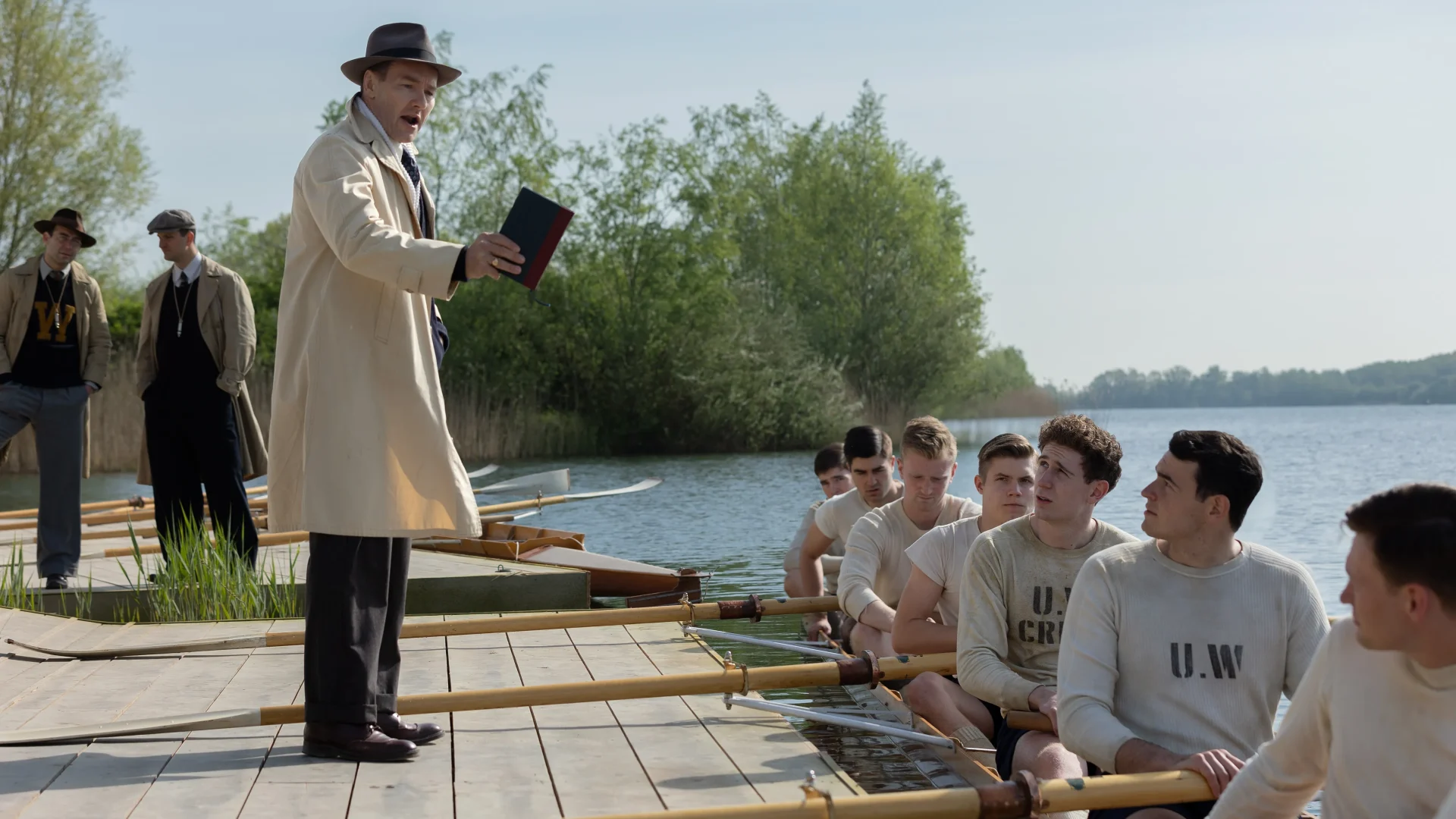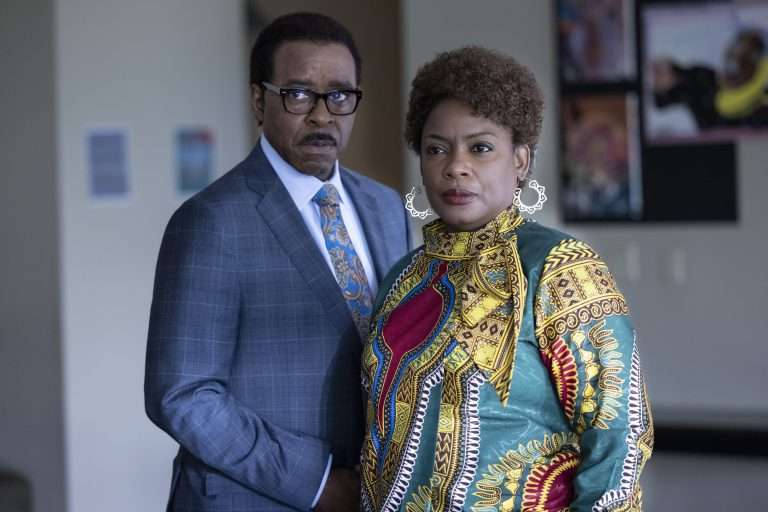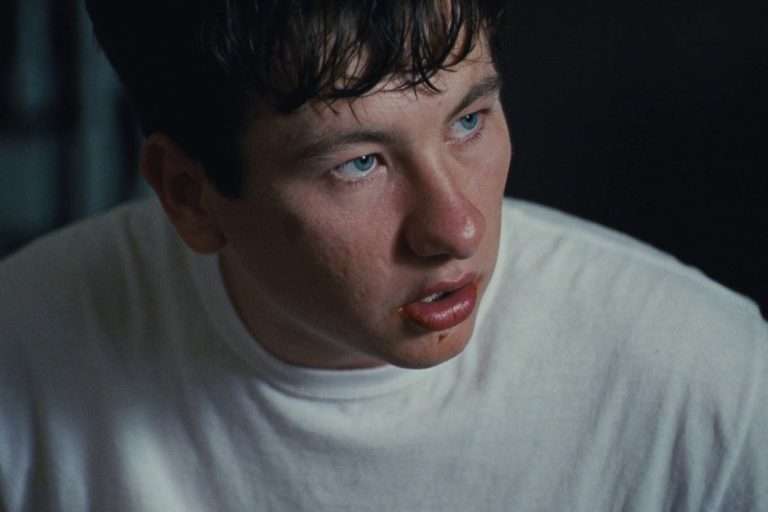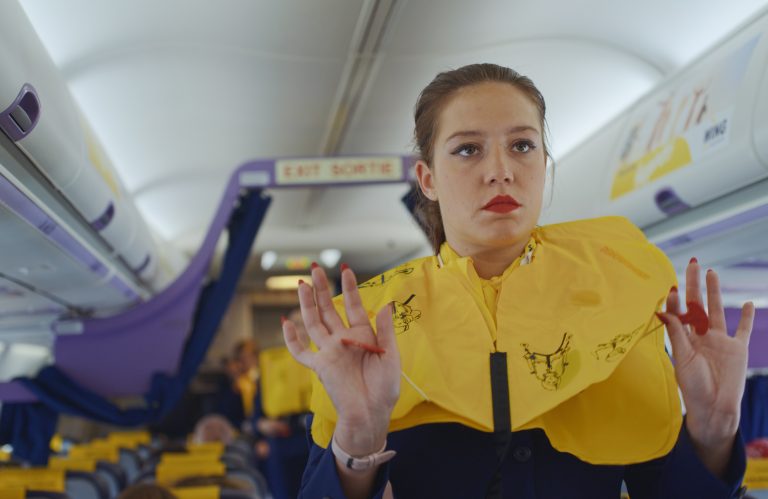Rowing is an incredibly repetitive sport, becoming tiresome as monotonous motions are played out over and over again. However, this can also very much read as an encapsulation of George Clooney’s latest feature, “The Boys in the Boat (2023),” which depicts the stereotypical yet undeniably miraculous true underdog story of the predominantly working-class University of Washington rowing team and their journey to the 1936 Berlin Olympics. Between this and his prior feature, “The Tender Bar,” Clooney can definitely be seen as a director trying to dispel the myth that they just don’t make films like they used to anymore. But, there is perhaps a reason for this, as “The Boys in the Boat” is unable to strike gold and instead arrives as a tired, lazy retelling of every hackneyed sports drama cliche.
The film’s focal point is Joe Rantz (Callum Turner), a member of the team who was cruelly abandoned by his father on the prospectless streets of Washington. Unfortunately, though Callum Turner possesses a surprising amount of screen charisma, Rantz is simply not a compelling protagonist to center the journey around, or at least the film doesn’t try to provide the character with any depth to make him interesting. Every detail we learn about Rantz is delivered with on-the-nose, declarative dialogue rather than allowing the audience to absorb his psychology subtly. Heightening this issue is Clooney’s laughably explicit attempts at manipulating the audience emotionally. Random introspective moments are juxtaposed with melodrama, all set to the backdrop of Alexandre Desplat’s score, serviceable in a vacuum but painfully overbearing in its utilization within the film.
Aiding Turner is the seasoned Joel Edgerton as Al Ubrickson, the rowing coach, whose arc similarly feels carbon copied to the point of plagiarism from every other sports drama in which a maverick coach with everything riding on his team’s success overcomes the odds to win big and prove his detractors wrong. His development also arrives as a sharp contradiction to the most basic of screenwriting rules, “show, don’t tell,” as domestic scenes between him and his wife Hazel (Cournety Henggeler) grind the already misjudged pace of the film to a grinding halt.
Neither performance is abhorrent, but both feel reigned in, distinctly not helped by the fact every moment of supposed dramatic tension falls flat with how surface-level the film chooses to tackle its principal subject matters. Not every movie has to have shocking twists, but framing the narrative in the way screenwriter Mark L. Smith does means that every single one of these climactic sequences holds any real weight. The film is as rigid in its adoption of formulas as it is predictable in the ways it goes about showing them. Sensationalized melodrama is shoehorned to the point where “The Boys in the Boat” serves as a comical checklist for every possible convention of the sports genre.

Wise older mentor characters, persistent underdogs who have been told their whole lives they are not going to amount to anything, a superfluous romantic subplot, a last-minute crisis of confidence before the grand finale and eventual achievement of whatever the simplistic goal of the film is. Every element has been seen before and used better in other works, with each character undergoing the most basic of arcs in a narrative comprising the most standard of beats.
The film is both shot and edited awkwardly as well, only reinforcing the lack of characterization and sloppy, cheesy dialogue on display. When we are not watching the rowing race sequences themselves, Martin Ruhe’s cinematography seems to be just placing the camera to make a nice shot with no underlying motives attached to the thematic exploration of the film. Even during the racing sequences, these sporting moments key in a movie within this genre’s success or failure, also don’t work given editor Tanya M. Swerling’s tendency to cut to characters such as Hadley Robinson’s Joyce Simdars, Rant’z partner, and other characters we couldn’t have developed less of a connection to during the course of the film’s overly padded 124 minutes.
As a film based on some pretty remarkable true events, it does as little as possible to create a visual spectacle or translate the source material for the screen. The information I gleaned from the film, I could have done so in a far more efficient manner by scrolling through Wikipedia, and instead, by taking the story in the most route-one direction, the pace of the film greatly suffers. As an audience, you are always five steps ahead of the film and are waiting for it to catch up. The ending doesn’t deliver the slightest bit of emotional resonance as you will either be aware of the result of the climactic race or will be able to work out where the film is heading the moment the “Olympics” is mentioned.
Lacking in substance, “The Boys in the Boat” doesn’t appear to challenge its audience in any way. Instead, it is filled with watered-down cliches, ludicrously obvious and heavy-handed melodrama, and direction so intent on delivering a film that will appeal to as broad a demographic as possible that it forgets to really target anyone specifically. It is so broad and universal in its aims that its tropes will make you grow to resent the film before it has even begun.







![The Sea Beast [2022] Netflix Review: A Swashbuckling Animated Adventure that Questions White Supremacy](https://79468c92.delivery.rocketcdn.me/wp-content/uploads/2022/07/The-Sea-Beast-2022-768x432.webp)
